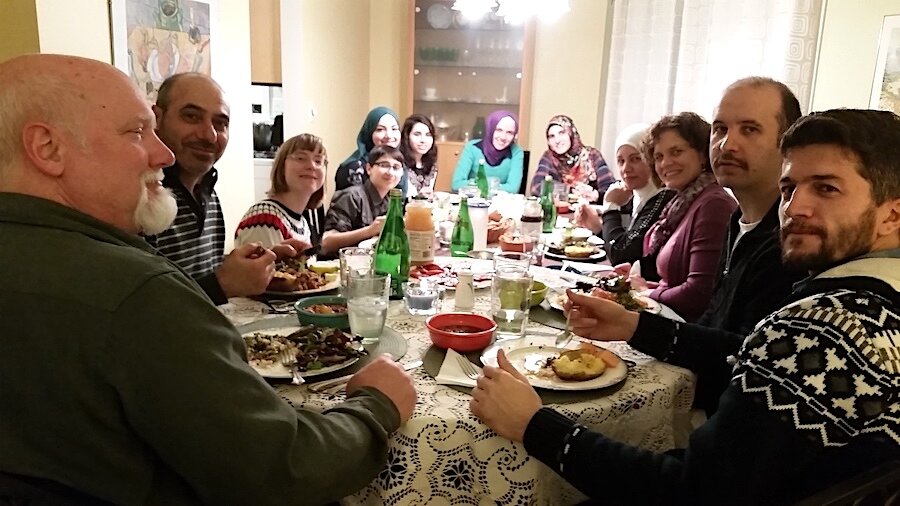Friendship, Peacemaking, and Bearing Witness
by Rick Love
With tears in his eyes, my friend and colleague Thomas Davis said to a group of Muslims, “Peacemaking is about friendship.” I think Thomas is right.
When someone wants to join Peace Catalyst International (PCI), we ask them about why they want to join a peacemaking organization. People who want to join PCI are typically people who like Muslims and who want to reach out to them. Because of this we are serious about helping them determine if PCI fits, or if what they really want is a mission agency. What is their motive for joining PCI? It is easy for Christians to love their neighbors or do peacemaking in order to bear witness. We don’t want people joining PCI with that kind of attitude. God commands us to love God and neighbor. Period.
During a PCI leadership team meeting recently we confessed that our past approach to sharing our faith was not focused on love or friendship. Even with the best intentions, our approach to bearing witness was really “project evangelism” – we saw people as targets and projects. Of course in theory we were committed to friendship evangelism. But we acknowledged what Christopher Heuertz and Christine D. Pohl say so well in their book, Friendship at the Margins: Discovering Mutuality in Service and Mission,
“Friendship evangelism” is another evangelistic approach very vulnerable to misuse and misinterpretation. Befriending someone merely so you can tell them the gospel is a form of manipulation and a violation of trust. Augustine argued that loving the neighbor meant wanting what was best for them, which is to know and love God. So desiring this for a friend is a very good thing. But it must involve more than words and strategy; it involves fidelity within the friendship itself (p 42).
We in PCI are trying to understand and practice what it means to have “fidelity within the friendship,” as the authors state above. Can we be faithful to the friendship and at the same time desire to bear witness of God’s amazing love through Jesus? What does it mean to be evangelical peacemakers. We aspire to be fruitful peacemakers and faithful evangelicals. What does this mean for us?
For us, peacemaking involves true friendship. God’s command to love our neighbor governs His command to share our faith. We need to love our neighbor with no strings attached – whether they want to hear the gospel or not. We please God when we love our neighbor without any other agenda. We also please God when we bear witness with gentleness and respect.
It is significant that questions about the gospel arise in the context of friendship. Here’s how the apostle Peter describes it:
But in your hearts set apart Christ as Lord. Always be prepared to give an answer to everyone who asks you to give the reason for the hope that you have. But do this with gentleness and respect (1 Peter 3:15).
Peter describes how we best answer people’s questions. If someone asks me for the hope that is within me, that means that we have a relationship. They know what makes me “tick.” They see something winsome or unique in my life that interests them (or maybe they just think I’m weird). But Peter realizes we can share our faith with the wrong attitude. So he concludes with the command to bear witness “with gentleness and respect.” Gentleness implies we share without arrogance or pushiness, and respect implies we show honor.
I like how The Message translates this: “Through thick and thin, keep your hearts at attention, in adoration before Christ, your Master. Be ready to speak up and tell anyone who asks why you're living the way you are, and always with the utmost courtesy.”
The apostle Paul has similar concerns:
Be wise in the way you act toward outsiders; make the most of every opportunity. Let your conversation be always full of grace, seasoned with salt, so that you may know how to answer everyone (Colossians 4:5-6).
Again, I like how The Message says it: “Be gracious in your speech. The goal is to bring out the best in others in a conversation, not put them down, not cut them out.”
Paul gives three exhortations about our witness: be wise, seize opportunities, speak graciously. But note the purpose of these exhortations. Like Peter, Paul assumes we are “answering” people’s questions: “so that you know how to answer everyone." Again, it highlights the give and take of real relationships.
In both passages, Peter and Paul assume we live lives worth questioning. We seek to love our neighbors without an agenda. In the context of friendship we show our love and, when appropriate, share about Jesus. We do have a message the Bible describes as good news. But God is concerned that we share this message with the right motives - true love, with no strings attached, and in the right manner - with grace, gentleness, and respect. That’s the calling of evangelical peacemakers. Easy to describe but quite a challenge to live!
I would like to hear what you think about the importance of motives, manner, and the role of friendship in peacemaking.










